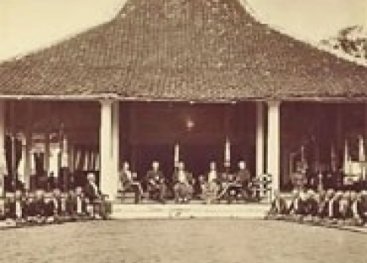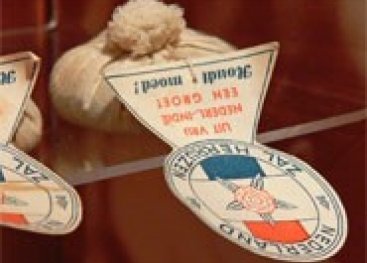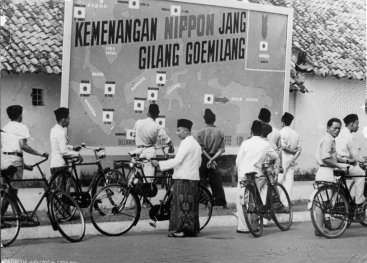
To the Netherlands
Personal Stories - Warga Negara
After the Indonesian Republic had been officially established, everyone had to choose a nationality.
Chinese Han Sie Dhian Ho: “My parents could choose Dutch, Chinese or Indonesian nationality. Given that we had no ties with China any more and didn’t know the Netherlands, we chose Indonesian nationality. We became Warga Negara. We never doubted our decision. Our family had lived in the East Indies for generations; it was where we belonged.”

Stop them from coming

In the chaotic period until the transfer of sovereignty in 1949, 110,000 Dutch and Dutch East Indian people were evacuated to the Netherlands for their safety and to regain their strength. They were mainly the elderly and the widows and orphans of war victims. Most remained in the Netherlands for good. After the transfer of sovereignty, all non-Indonesian people had to choose between Dutch or Indonesian nationality (Warga Negara).
Several hundred thousand more Dutch and Dutch East Indian people left for the ‘mother country’, which they were often seeing for the first time. The Dutch government did everything it could to stop them from coming. After all, the post-war Netherlands was impoverished and there was a great housing shortage. Because of the conditions in Indonesia, the government nonetheless allowed new groups in time and again.
Moluccans

the port of Rotterdam.
In 1950 and 1951, the first to arrive were civil servants and members of the military. Among them were some 12,500 Moluccans who were taken to the Netherlands ‘temporarily’ for their safety, as Indonesia refused to recognise an independent Moluccan republic. Unfortunately most of them never had the opportunity to return to their homeland.
Anti-Dutch feeling
Between 1952 and 1957, many Dutch East Indians followed, because anti-Dutch feeling was growing in Indonesia. In 1957, the Indonesian government decided that all Dutch nationals had to leave. In the years to come, tens of thousands of people who regretted their initial decision to adopt Indonesian nationality arrived in the Netherlands.
The final major group of ‘repatriates’ arrived in 1962, when New Guinea - which up until then had been a part of the Netherlands - also became Indonesian.
Silver lining

Dolf Leidelmeijer’s Dutch East Indian family chose to hold on to their Dutch nationality. It made life in Indonesia very difficult.
“I was fired because I was Dutch. My job was taken over by an Indonesian. We wanted to go to the Netherlands but were refused permission. We became poorer and poorer and were going hungry. Luckily, when my wife contracted TB, she was allowed to go to the Netherlands to recover. My four children and I had to stay behind. A Dutch social worker intervened and made sure we were eventually allowed to return to the Netherlands after all. We did have to prove that we were Dutch nationals under the 1892 act, and we had to pay for our trip ourselves. We didn’t have a penny left, but fortunately we were able to get away.”
Moluccan soldiers in trouble

The Moluccan KNIL soldiers found themselves in a difficult position. The Indonesians considered them traitors, and the Netherlands was hardly welcoming them with open arms.
Moluccan Ferry Kaihatu: “The Indonesians considered my father to be a traitor. He was blacklisted. Our family had to leave instantly. We were promised a return to our own country, the Moluccas, but that never happened. My father was given an honourable discharge in the Netherlands. He was told to claim his pension from the new government in Indonesia.”
Warm clothes in Ataka
Overflowing ships departed for the Netherlands. The regular stopover was in Ataka on the Suez Canal, where the ‘repatriates’ were given warm clothing. Seven-year-old Dutch girl Ineke Kuijk travelled to the strange, cold mother country with her mother and younger brother. Her father was murdered by the Japanese.
"Our suitcases were our only possessions. We came from Central Java via Semarang to Batavia. There, we had to wait in a refugee camp for four months. We were given warm clothes, like a scarf and a woolly hat, during a stopover in Ataka. We needed them immediately in the Netherlands. At the end of April 1946, it was cold and grim.”
Crying on the afterdeck
 Dutch woman Bep Stenger had been imprisoned because of her resistance work. In January 1946, she found a place on a ship sailing for the Netherlands by signing on as a cleaner.
Dutch woman Bep Stenger had been imprisoned because of her resistance work. In January 1946, she found a place on a ship sailing for the Netherlands by signing on as a cleaner.
“But the vomiting women and the stuffy conditions in the hold made me ill. Then I became a potato peeler on deck. (...) I was very sad to say goodbye to the East Indies. When the ship left I was crying on the afterdeck. It was my country, too! The reception in the Netherlands was terrible. The first thing my uncle said was: Don’t bother telling us your stories, it's been much worse here.”

